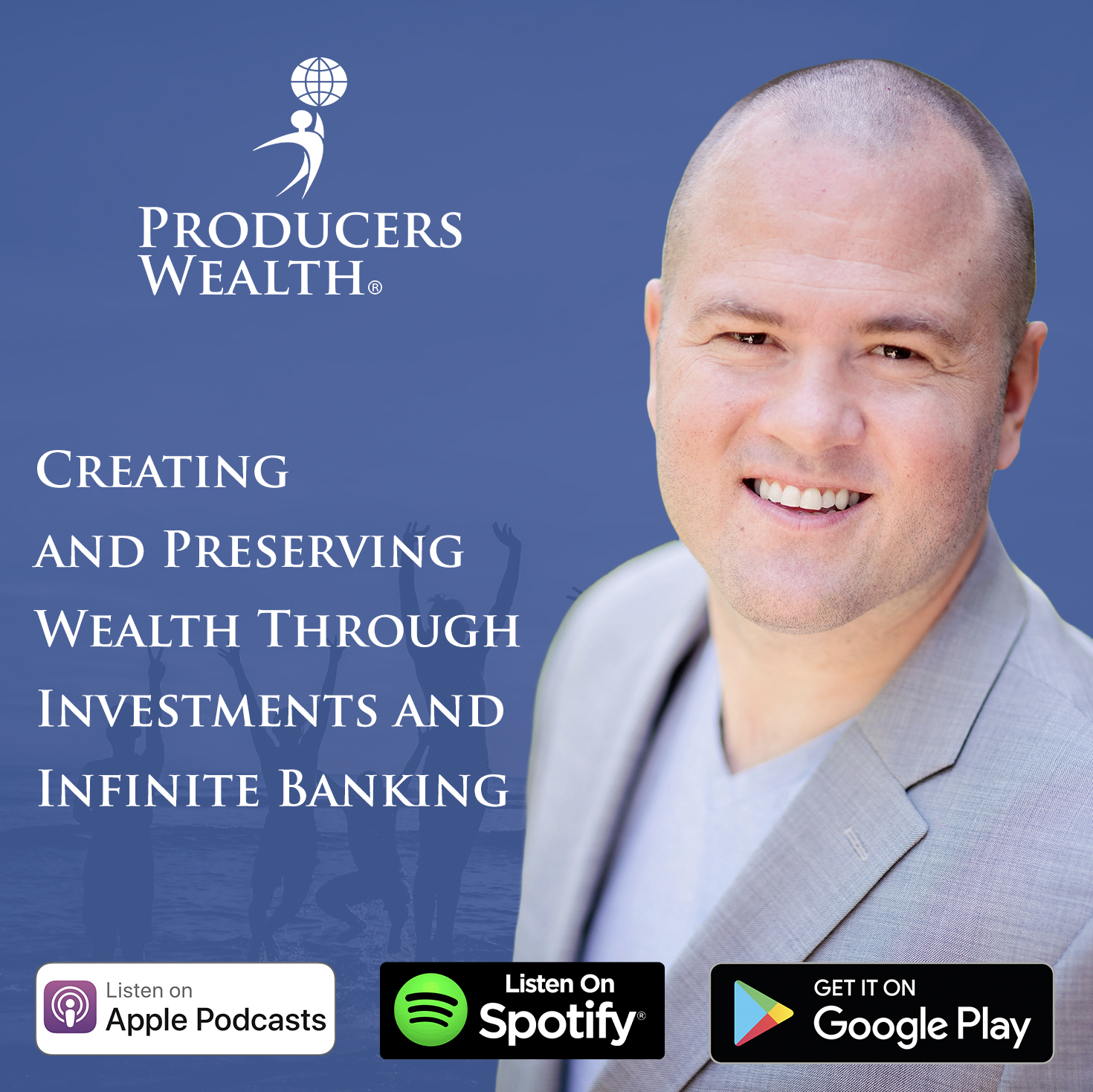
If a penny doubled every day for 30 days, it would compound to $5,368,709.12… That’s just the penny doubling…
But what if with every double, you had to pay 30% in taxes?
At the end of 30 days, you would only have $81,934.66 left.
Due to taxes, you lost $5,286,774.46.
Whether you know it or not, due to taxes, you’re on the wrong side of a compound interest equation.
You have to account for taxes in a financial plan–if you don’t, taxes could destroy you.
To control taxes, you pay taxes on the seed, not the harvest. Since we can’t predict what tax rates will be, deferring taxes to the “harvest” is a dangerous game.
But what do financial institutions and the government incentivize you to do? Pay taxes on the harvest. Remember, Uncle Sam’s not your real uncle. These institutions benefit from you paying more in taxes.
You’re Not Playing the Game
If you do not deal with Wall Street and Washington D.C. on your terms and keep them out of your pockets, you will never build the wealth you have the potential to build.
I’m going to say something that might make people mad: the tax code is 100% fair.
The tax code is a book thicker than the encyclopedia, and it’s filled with ways you can legally reduce your taxes.
The tax code is fair—if you play the game.
The tax code rewards creators and producers. Employees and self-employed people pay the most in taxes, while business owners and investors pay the least. The government is incentivizing business owners, who create value in the marketplace through their products or services. Business owners take on risk so they can solve problems for consumers through what they create. Earning income through owning a business is one of the most tax-efficient types of income to earn.
The tax code also incentivizes you on where to position your capital. If you warehouse your capital inside a dividend-paying whole life insurance policy with a mutual insurance company, your capital grows tax-free. Why?
Life insurance is a bedrock of society. If someone in a community passes away, life insurance provides for the family of the deceased. Without life insurance, if the breadwinner of a family died, the surviving family members would need financial support from the government or would need to be helped out by extended family and friends. In a world without life insurance, every death would turn into a financial catastrophe that would cause grieving families to lose their lifestyles. Life insurance benefits society, so the government encourages people to have life insurance policies by making them tax-free savings vehicles.
After you’ve earned tax-efficient income and practiced tax-efficient capital warehousing, the third step to winning the tax game is tax-efficient deployment of capital. The tax code incentivizes specific investment areas that benefit society.
For example, the tax code incentivizes you to reinvest in your business. When you grow your business, you’re creating more jobs and adding more value to the marketplace. As your business grows, you’ll need more equipment from vendors, which helps those businesses grow as well. Growing your business stimulates the economy, so it’s tax-efficient to reinvest in your business.
The government doesn’t want to be a landlord, so real estate investing is also incentivized. The government needs real estate investors to provide affordable housing for people, so real estate is a tax-efficient investment.
Another incentivized investment area is energy, whether it’s oil and gas or greener technologies.
To be tax efficient, you need to legally reduce your taxes by playing the tax game and pay taxes on the seed, not the harvest. The worst financial strategy on the planet is to defer taxes until a future date, like you do with qualified plans like 401(k)s, 403(b)s, and IRAs.
If you use the tax code as a rulebook, you can reduce your taxes so you can pay as little as possible. You should absolutely pay the taxes you owe… But that doesn’t mean you have to leave Uncle Sam a tip.
After all, Uncle Sam is not your Uncle!
Capture Your Capital First
So, you’ve played the tax game.
You’ve earned tax-efficient income, stored it in a tax-efficient warehouse, and deployed it in an efficient way.
You’ve reduced your tax burden, but you still have to pay some amount in taxes. What now?
Before paying taxes, you’re going to first capture that capital in your banking system and pay taxes through a policy loan.
Then, you can pay yourself back all at once or over a period of time.
Let’s say a business owner takes $1 million in income per year from the business and pays $300,000 a year in taxes over a ten-year period. That’s a $3 million cashflow leak…
Not to mention the opportunity cost of $3 million. Can you imagine what that $3 million could have grown to if it earned 3-4% tax-free?
I am getting nauseous just thinking about it.
But if you capture the capital before paying taxes to the government, you don’t pay the opportunity cost of that leak because you can allow that capital to compound in the policy.
Protect Your Biggest Assets
In the United States, you don’t have to do anything wrong to get sued. As a business owner, you probably know this.
But what’s shocking is that 95% of lawsuits settle out of court… Business owners surrender to their creditors because they realize that they weren’t as protected as they should have been and don’t want to lose more money to legal fees. They thought they were bulletproof, but they weren’t, and they lose money as a result.
When you have proper asset protection in place, you can flip this narrative: your creditors will drop the lawsuit before it goes to court because they realize they can’t win anything from you.
However, there’s always a chance that you’ll be sued and need to go to court. A banking system allows you to have liquidity on hand to afford to put up a legal fight–and avoid settling out of court because you don’t have cash on hand to fund a legal battle.
Estate Planning
“A good man leaves an inheritance for his children’s children.”–Proverbs 13:22
Believe it or not, I run into people all the time who say, “When I die, I’m not leaving anything for anybody.”
What these people don’t understand is that inheritance doesn’t have to come in the form of a check. A more impactful legacy is to give your heirs a system that allows them to tap into opportunities and grow the family wealth after you’re gone.
The goal of estate planning is to protect, preserve, and expand the wealth of the family, contractually, for generations and generations to come. Plant the seeds of a tree that you will never sit beneath.
The Family Office Model, which has been used by wealthy families throughout history, from the Medicis to the Rothschilds to the Sassoons to the Rockefellers, tells you how to adopt this philosophy. There are five components to this model:
- Family legacy assets
- The family legal and tax structures
- The family bank
- Family asset management
- Family masterminds
Family legacy assets include a statement of purpose (which is like your family’s Declaration of Independence), a family Constitution that covers your guiding principles and framework, and a family legacy library that includes videos, letters, photos, and more that you can leave for your descendants. Your family legacy assets allow you to share your values with future generations.
The family legal and tax structures provide the infrastructure to protect the assets, optimize transferring them through estate planning strategies throughout every generation, and reduce taxes legally.
The family bank finances the entire family, whether it be for personal, business, or investing matters. It is the mechanism that compounds the capital of the family tax-free forever.
The family asset management includes the active management of the family assets, making sure the family’s assets are aligned at all times to ensure the wealth potential of the family. Assets such as income-generating businesses and real estate that are aligned with the family’s wealth DNA are actively managed with the asset management team, strategy, systems, vehicles, and processes.
The family masterminds are retreats in which the family gets aligned on the vision and goals of the family, the family guiding principles and values, and shares best practices.
These five components allow you to protect, preserve, and expand your family’s wealth across generations–to be like the Rockefellers, not the Vanderbilts.
When you ask a poor or middle-class family how much life insurance they want to buy, they either tell you that they want to self-insure (which means having no insurance) or they will buy term and invest the rest.
But when you ask a wealthy family how much life insurance they want to buy, their answer is, “As much as they will sell me.”
Before you read this book, you probably thought they were crazy. But now, do you start to understand why the family bank is foundational in protecting, preserving, and expanding the wealth of the family? With each and every generation, when life insurance is maxed out, there’s a windfall of millions of dollars from one generation to another as family members pass away. Family offices call this the “waterfall strategy.” This is what families like the Rockefellers do to ensure that the wealth built by one generation is multiplied when it is transferred from one generation to the next and isn’t lost by the next generation.
You do not have to be a Rockefeller to protect, preserve, and expand your family’s wealth like a Rockefeller.
Watch all of our educational videos on Infinite Banking here.
Disclaimer and Waiver
Michiel Laubscher & Laubscher Wealth Management LLC is not an investment advisor and is not licensed to sell securities. None of the information provided is intended as investment, tax, accounting, or legal advice, as an offer or solicitation of an offer to buy or sell, or as an endorsement, of any company, security, fund, or other offerings. The information should not be relied upon for purposes of transacting securities or other investments. Your use of the information contained herein is at your own risk. The content is provided ‘as is’ and without warranties, either expressed or implied. Michiel Laubscher & Laubscher Wealth Management LLC does not promise or guarantee any income or specific result from using the information contained herein and is not liable for any loss or damage caused by your reliance on the information contained herein. Always seek the advice of professionals, as appropriate, regarding the evaluation of any specific information, opinion, or other content.





